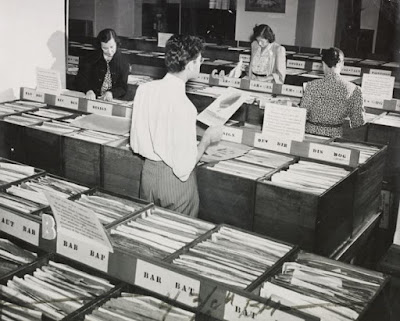Pictures at War
Reading war news aboard streetcar. San Francisco, California. 1941. John Collier. The Miriam and Ira D. Wallach
Division of Art, Prints and Photographs: Photography Collection, The New York Public Library.
Pictures at War
Did you know that the New York Public Library's Picture Collection was a key resource for the Armed Forces during World War II?
Here is an excerpt from the Annual Report for 1943:
"The enemy loomed large as the most popular subject in picture requests
during the year. Since a soldier is taught to bayonet the enemy and not
some undefined abstraction, he must learn to recognize that enemy; a
bombardier must be able to visualize the appearance of the factory which is to be
his target; a designer of camouflage must have the specific knowledge of the shape
of forests in the battle area as seen from the air.
War leaders require pictorial surveys preceding decisions of strategy and action.
Direct information for the use of the Army, Navy and Marine Corps was supplied
by this picture collection through photographs of territories along the routes of the
planned action. Just before the attack on Pearl Harbor, the travel bureau of an Axis
country donated its photographic collection to this department. In January, these
121 photographs were turned over to the Army Air Corps headquarters for filming and
enlargement; they were “of immense value in the prosecution of the war”
Long in advance of the invasion along the Mediterranean, leaflets, clippings,
photographs and post cards from the Picture Collection were consulted by the
information services of the War Department for pictorial facts about North Africa
– air views of railroad terminals, shapes of leaves of poisonous plants, the sheep
dogs used by natives, native dwellings and the natives themselves.
To prevent the inadvertent disclosure of strategic military moves, the entire geographic
collection, about ten per cent of the entire file, was withdrawn from public
use and reserved for government agencies. Otherwise the calls for scenes of Sicily,
the valley of the Ruhr, factories at Essen and Turin would have left obvious gaps.
Pictures borrowed from this collection helped impart the visual facts and experience
which are necessary equipment for warfare of global extent. The pictorial
needs of the government were not fully met by the existing picture sources in
Washington, and the lending privilege of this collection enhances its usefulness by
freeing the pictures for direct participation at conference table, camp and laboratory.
These pictures are used by the government to illustrate manuals and films; to
yield information of military interest in the assembly of facts about the enemy; to
strengthen the power of printed propaganda by addition of visual interpretation; to
simplify and dramatize messages to the people; to foster morale, loyalty and unity
through the graphic media of cartoons, photographs, posters and moving pictures."
Annual Report of the Picture Collection, 1943
Excerpted from: Bulletin of the New York Public Library, Astor, Lenox and Tilden
Foundations. New York. Volume 47, pp. 210-212.




Comments
Post a Comment